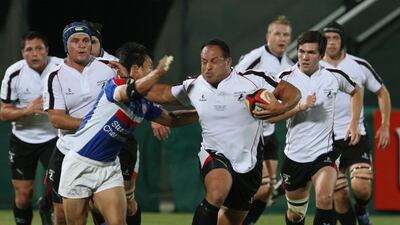When the Arabian Gulf played its last match before being disbanded as a rugby entity, on this day in 2010, there was an acute end-of-an-era feel.
There was merchandise on sale, which was unusual at the best of times for a team without a huge consumer market, but especially now. Really, it was just a closing down sale.
Plus there was so much uncertainty as to what would come next. The players were drawn – as the name suggests – from all over the Gulf.
Yet only one country – UAE, who would immediately assume the Gulf side’s place within Asian rugby competition, although not in the IRB rankings – would be ready to continue straight away after the change. So many of the players were suddenly in limbo.
It provided opportunities for some. Jonny Macdonald, the young scrum-half who was the heartbeat of the side, was given the chance to swap his international allegiance when the Gulf was delisted.
As a result, he was picked up by Scotland and selected to go to the Hong Kong Sevens, which was quite the achievement for a player born and raised in Abu Dhabi.
But many others were lost to representative rugby. David Clark, the No 8 who was one of the greats of Gulf rugby, was ruled ineligible to play for the UAE.
It seemed harsh. He was resident in Bahrain, but played his Friday club rugby for Dubai Exiles, and had been a long-time resident of the city previously.
Bahrain-raised James Love, like Macdonald, was also a young player of outstanding talent. But he was also lost to the international game.
He went off to play professionally in the UK, and returned in recent years to play for Jebel Ali Dragons in Dubai.
“Some of the guys are in the rugby wilderness now,” said Mark Gathercole, whose 33rd and last Test was the Gulf’s final game.
And yet, amid the uncertainty, came something special.
The players given the honour of bringing down the curtain on 17 years of Test rugby as a collective union refused to go gently into extinction.
Instead, they saved their very best for last, beating a South Korea side who had for so long been the only vague rivals Japan had at the top of Asian rugby.
The lights appeared to have gone out early on their challenge, both literally and metaphorically, when a floodlight pylon on Pitch One at The Sevens failed while they were trailing early in the second-half.
However, the damage was repaired, first by the ground's technicians, then by a fine display by the Gulf fly-half, Duncan Murray.
Having trailed 14-6 at half-time, the Gulf came back to earn a 21-19 lead with a late try and conversion by Trent Eastgate and a conversion by Love.
Victory did require a missed kick at goal by Korea in the last play of the game, but it felt like little more than the Gulf deserved.
“The pinnacle of any rugby player's dreams is to play international rugby,” Mike Cox-Hill, the Gulf’s last captain, said after the win.
“Over 99 per cent of the world's rugby players don't get that opportunity.
“To have the privilege to do that and to lead the Arabian Gulf has been a huge honour.
“To finish it off with a win over Korea is phenomenal. I wouldn't change it for the world.
“The camaraderie and brotherhood that has been built, we will cherish forever.”


